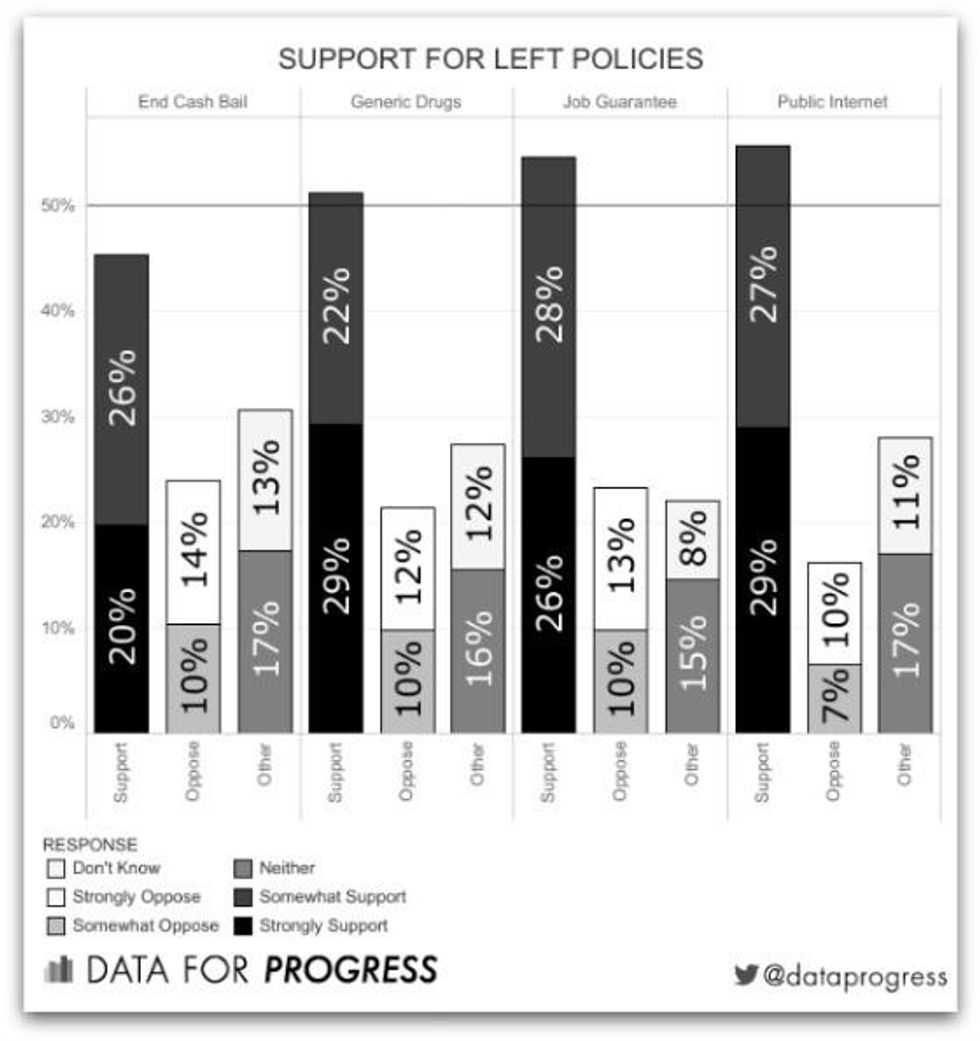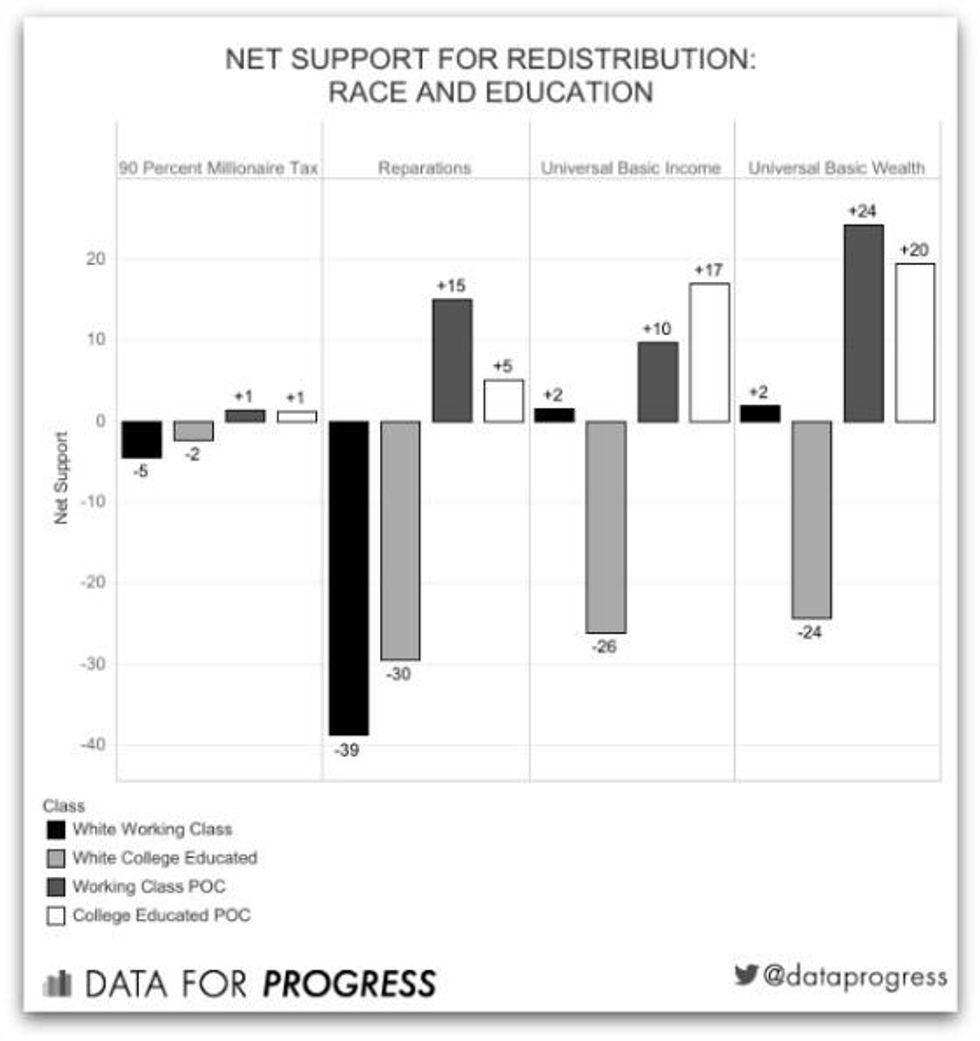

SUBSCRIBE TO OUR FREE NEWSLETTER
Daily news & progressive opinion—funded by the people, not the corporations—delivered straight to your inbox.
5
#000000
#FFFFFF
To donate by check, phone, or other method, see our More Ways to Give page.


Daily news & progressive opinion—funded by the people, not the corporations—delivered straight to your inbox.

New York congressional candidate Alexandra Ocasio-Cortez speaks in support of Kansas Democrat Brent Welder at Jack Reardon Convention Center on Friday, July 20, 2018, in Kanas City, Kansas.
As the corporate media and centrist Democrats continue fearmongering over the alleged pitfalls of running on a bold left-wing platform in the 2018 midterms and beyond, new polling data released Wednesday shows that--contrary to what elite pundits suggest--"unabashedly left" policies are "incredibly popular" among the American electorate.
"Turning these favorable impressions into durable support will require activists and politicians to put these issues on the national agenda and make a forceful case for them over time." --Data for Progress
Focusing on progressive policy ideas that aren't frequently surveyed but could come into play in upcoming elections--such as a federal jobs guarantee, ending cash bail, and manufacturing generic versions of life-saving drugs--the progressive policy shop Data for Progress (DFP) "consistently found that voters are more likely to want big-ticket progressive agenda items that are dismissed by the pundit class as electoral doom than policies that Republican candidates regularly commit to on the campaign trail and pursue while in office."
DFP's survey found that 55 percent of eligible voters polled expressed support for a jobs guarantee--a proposal backed by several senators, including Sen. Bernie Sanders (I-Vt.)--while only 23 percent expressed opposition. The idea of a "public option for the internet"--one of Michigan gubernatorial candidate Abdul El-Sayed's major policy planks--garnered similarly strong support, with 56 percent of respondents saying they approve of the policy.
Crucially, DFP notes, these proposals are "popular across urban, suburban, and rural geographies"--a finding that runs counter to the common notion that a bold left-wing agenda would be rejected in regions like the Midwest. The policies were also viewed favorably across race and education lines.

Other policies DFP examined--such as a universal basic income and a 90 percent millionaire tax--were viewed less favorably across the board, but still attracted support from working class voters.
"A marginal tax of 90 percent on income over a million dollars (our version of a maximum income) had narrow support among people of color, but was opposed by whites," DFP found. "Analyzing income we see a similar trend: the universal basic income and universal basic wealth are most popular among low-income adults and least popular among higher income adults (even those who would not expect to see their taxes increase)."
Sean McElwee, co-founder of Data for Progress, noted on Twitter that "reparations, universal basic income, and 90 percent tax rates are more popular than the Republican healthcare plan. The reason one is on the agenda and the other is not is because one party will do whatever it takes to exert its ideological vision on the world."

In conclusion, DFP noted that "public opinion is inherently fluid" and that favorable attitudes among the American electorate is not sufficient to build lasting support for a progressive agenda.
"Turning these favorable impressions into durable support will require activists and politicians to put these issues on the national agenda and make a forceful case for them over time," DFP argued.
Dear Common Dreams reader, The U.S. is on a fast track to authoritarianism like nothing I've ever seen. Meanwhile, corporate news outlets are utterly capitulating to Trump, twisting their coverage to avoid drawing his ire while lining up to stuff cash in his pockets. That's why I believe that Common Dreams is doing the best and most consequential reporting that we've ever done. Our small but mighty team is a progressive reporting powerhouse, covering the news every day that the corporate media never will. Our mission has always been simple: To inform. To inspire. And to ignite change for the common good. Now here's the key piece that I want all our readers to understand: None of this would be possible without your financial support. That's not just some fundraising cliche. It's the absolute and literal truth. We don't accept corporate advertising and never will. We don't have a paywall because we don't think people should be blocked from critical news based on their ability to pay. Everything we do is funded by the donations of readers like you. Will you donate now to help power the nonprofit, independent reporting of Common Dreams? Thank you for being a vital member of our community. Together, we can keep independent journalism alive when it’s needed most. - Craig Brown, Co-founder |
As the corporate media and centrist Democrats continue fearmongering over the alleged pitfalls of running on a bold left-wing platform in the 2018 midterms and beyond, new polling data released Wednesday shows that--contrary to what elite pundits suggest--"unabashedly left" policies are "incredibly popular" among the American electorate.
"Turning these favorable impressions into durable support will require activists and politicians to put these issues on the national agenda and make a forceful case for them over time." --Data for Progress
Focusing on progressive policy ideas that aren't frequently surveyed but could come into play in upcoming elections--such as a federal jobs guarantee, ending cash bail, and manufacturing generic versions of life-saving drugs--the progressive policy shop Data for Progress (DFP) "consistently found that voters are more likely to want big-ticket progressive agenda items that are dismissed by the pundit class as electoral doom than policies that Republican candidates regularly commit to on the campaign trail and pursue while in office."
DFP's survey found that 55 percent of eligible voters polled expressed support for a jobs guarantee--a proposal backed by several senators, including Sen. Bernie Sanders (I-Vt.)--while only 23 percent expressed opposition. The idea of a "public option for the internet"--one of Michigan gubernatorial candidate Abdul El-Sayed's major policy planks--garnered similarly strong support, with 56 percent of respondents saying they approve of the policy.
Crucially, DFP notes, these proposals are "popular across urban, suburban, and rural geographies"--a finding that runs counter to the common notion that a bold left-wing agenda would be rejected in regions like the Midwest. The policies were also viewed favorably across race and education lines.

Other policies DFP examined--such as a universal basic income and a 90 percent millionaire tax--were viewed less favorably across the board, but still attracted support from working class voters.
"A marginal tax of 90 percent on income over a million dollars (our version of a maximum income) had narrow support among people of color, but was opposed by whites," DFP found. "Analyzing income we see a similar trend: the universal basic income and universal basic wealth are most popular among low-income adults and least popular among higher income adults (even those who would not expect to see their taxes increase)."
Sean McElwee, co-founder of Data for Progress, noted on Twitter that "reparations, universal basic income, and 90 percent tax rates are more popular than the Republican healthcare plan. The reason one is on the agenda and the other is not is because one party will do whatever it takes to exert its ideological vision on the world."

In conclusion, DFP noted that "public opinion is inherently fluid" and that favorable attitudes among the American electorate is not sufficient to build lasting support for a progressive agenda.
"Turning these favorable impressions into durable support will require activists and politicians to put these issues on the national agenda and make a forceful case for them over time," DFP argued.
As the corporate media and centrist Democrats continue fearmongering over the alleged pitfalls of running on a bold left-wing platform in the 2018 midterms and beyond, new polling data released Wednesday shows that--contrary to what elite pundits suggest--"unabashedly left" policies are "incredibly popular" among the American electorate.
"Turning these favorable impressions into durable support will require activists and politicians to put these issues on the national agenda and make a forceful case for them over time." --Data for Progress
Focusing on progressive policy ideas that aren't frequently surveyed but could come into play in upcoming elections--such as a federal jobs guarantee, ending cash bail, and manufacturing generic versions of life-saving drugs--the progressive policy shop Data for Progress (DFP) "consistently found that voters are more likely to want big-ticket progressive agenda items that are dismissed by the pundit class as electoral doom than policies that Republican candidates regularly commit to on the campaign trail and pursue while in office."
DFP's survey found that 55 percent of eligible voters polled expressed support for a jobs guarantee--a proposal backed by several senators, including Sen. Bernie Sanders (I-Vt.)--while only 23 percent expressed opposition. The idea of a "public option for the internet"--one of Michigan gubernatorial candidate Abdul El-Sayed's major policy planks--garnered similarly strong support, with 56 percent of respondents saying they approve of the policy.
Crucially, DFP notes, these proposals are "popular across urban, suburban, and rural geographies"--a finding that runs counter to the common notion that a bold left-wing agenda would be rejected in regions like the Midwest. The policies were also viewed favorably across race and education lines.

Other policies DFP examined--such as a universal basic income and a 90 percent millionaire tax--were viewed less favorably across the board, but still attracted support from working class voters.
"A marginal tax of 90 percent on income over a million dollars (our version of a maximum income) had narrow support among people of color, but was opposed by whites," DFP found. "Analyzing income we see a similar trend: the universal basic income and universal basic wealth are most popular among low-income adults and least popular among higher income adults (even those who would not expect to see their taxes increase)."
Sean McElwee, co-founder of Data for Progress, noted on Twitter that "reparations, universal basic income, and 90 percent tax rates are more popular than the Republican healthcare plan. The reason one is on the agenda and the other is not is because one party will do whatever it takes to exert its ideological vision on the world."

In conclusion, DFP noted that "public opinion is inherently fluid" and that favorable attitudes among the American electorate is not sufficient to build lasting support for a progressive agenda.
"Turning these favorable impressions into durable support will require activists and politicians to put these issues on the national agenda and make a forceful case for them over time," DFP argued.